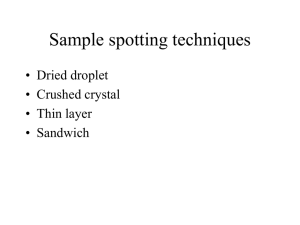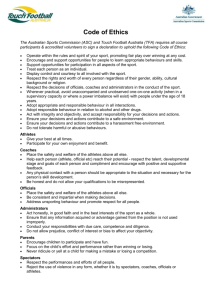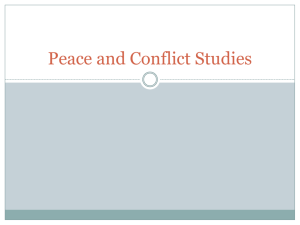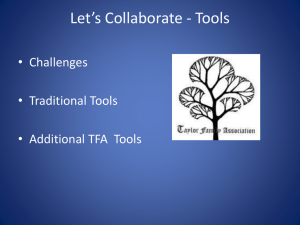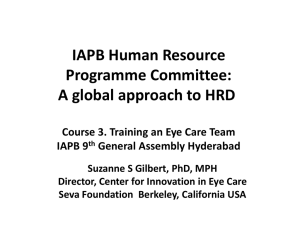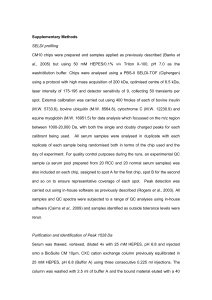An Analysis of the Tropical Forest Alliance 2020
advertisement
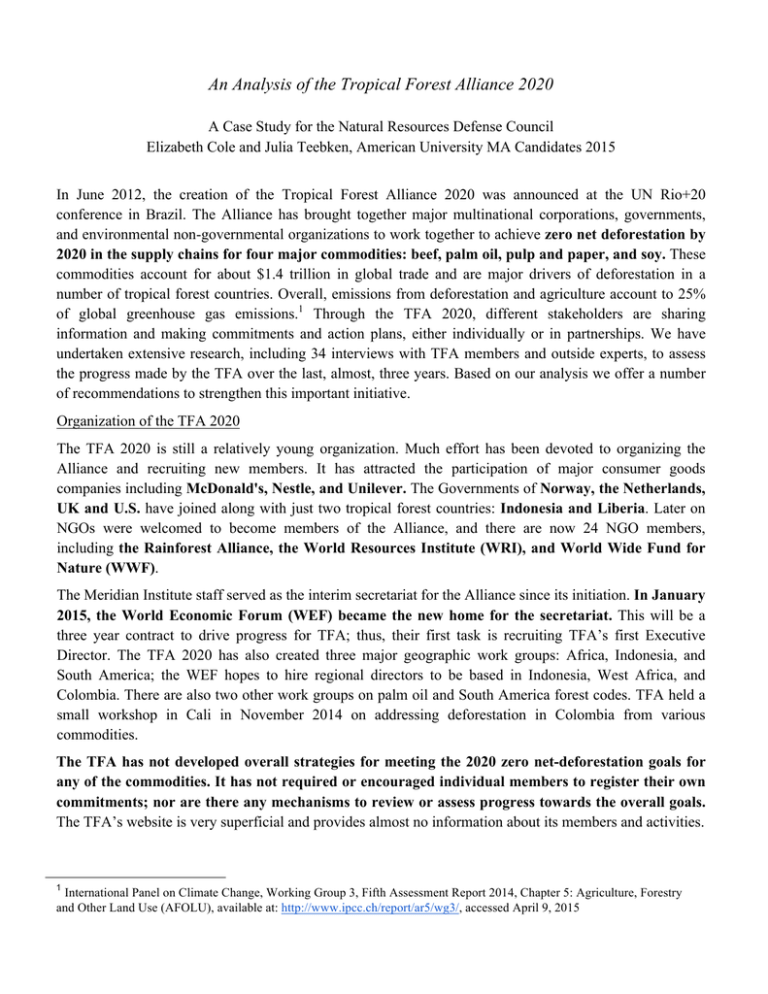
An Analysis of the Tropical Forest Alliance 2020 A Case Study for the Natural Resources Defense Council Elizabeth Cole and Julia Teebken, American University MA Candidates 2015 In June 2012, the creation of the Tropical Forest Alliance 2020 was announced at the UN Rio+20 conference in Brazil. The Alliance has brought together major multinational corporations, governments, and environmental non-governmental organizations to work together to achieve zero net deforestation by 2020 in the supply chains for four major commodities: beef, palm oil, pulp and paper, and soy. These commodities account for about $1.4 trillion in global trade and are major drivers of deforestation in a number of tropical forest countries. Overall, emissions from deforestation and agriculture account to 25% of global greenhouse gas emissions.1 Through the TFA 2020, different stakeholders are sharing information and making commitments and action plans, either individually or in partnerships. We have undertaken extensive research, including 34 interviews with TFA members and outside experts, to assess the progress made by the TFA over the last, almost, three years. Based on our analysis we offer a number of recommendations to strengthen this important initiative. Organization of the TFA 2020 The TFA 2020 is still a relatively young organization. Much effort has been devoted to organizing the Alliance and recruiting new members. It has attracted the participation of major consumer goods companies including McDonald's, Nestle, and Unilever. The Governments of Norway, the Netherlands, UK and U.S. have joined along with just two tropical forest countries: Indonesia and Liberia. Later on NGOs were welcomed to become members of the Alliance, and there are now 24 NGO members, including the Rainforest Alliance, the World Resources Institute (WRI), and World Wide Fund for Nature (WWF). The Meridian Institute staff served as the interim secretariat for the Alliance since its initiation. In January 2015, the World Economic Forum (WEF) became the new home for the secretariat. This will be a three year contract to drive progress for TFA; thus, their first task is recruiting TFA’s first Executive Director. The TFA 2020 has also created three major geographic work groups: Africa, Indonesia, and South America; the WEF hopes to hire regional directors to be based in Indonesia, West Africa, and Colombia. There are also two other work groups on palm oil and South America forest codes. TFA held a small workshop in Cali in November 2014 on addressing deforestation in Colombia from various commodities. The TFA has not developed overall strategies for meeting the 2020 zero net-deforestation goals for any of the commodities. It has not required or encouraged individual members to register their own commitments; nor are there any mechanisms to review or assess progress towards the overall goals. The TFA’s website is very superficial and provides almost no information about its members and activities. 1 International Panel on Climate Change, Working Group 3, Fifth Assessment Report 2014, Chapter 5: Agriculture, Forestry and Other Land Use (AFOLU), available at: http://www.ipcc.ch/report/ar5/wg3/, accessed April 9, 2015 Progress on Indonesian Palm Oil To date, the TFA 2020 has focused on palm oil production in Indonesia, a subject of concern of many NGOs for years. Deforestation due to new industrial palm oil plantations accounts for up to 80% of Indonesia’s total GHG emissions and makes the country one of the largest GHG emitters worldwide today.2 In June 2013, the TFA 2020 organized a large workshop in Jakarta, which brought Indonesia’s major palm oil producers to the table. At the September 2014 UN Climate Summit in New York, the major Indonesian palm oil producers including Asian Agri, Golden Agri Resources, and Wilmar - supported by the Indonesian Chamber of Commerce KADIN - issued the Indonesia Palm Oil Pledge. The companies promised to adopt and promote solutions for deforestation-free and sustainable palm oil. Golden Agri Resources and Wilmar also joined the New York Declaration on Forests issued at the Summit, which included a pledge to halve forest loss by 2020 and end deforestation by 2030. Recommendations Some of or our interviewees were hopeful about the prospects for the TFA 2020, but many were disappointed and frustrated. Some did go as far to say that the TFA is little more than “greenwashing”. If the TFA is to make progress towards their goal of zero net deforestation by 2020, several changes need to be made. First, there needs to be a greater push for developing and implementing actions plans. We recognize that supply chains are very complicated with middlemen and smallholders. The TFA 2020 secretariat needs to emphasize the urgency of the matter: there are only five years left to reach the 2020 target. Thus, the action plans need to be aggressive, with timelines and quantitative goals. Second, the TFA 2020 should create a registry of commitments, that would not only provide greater transparency and accountability, but would also serve as a useful mechanism for sharing information among companies, governments and NGOs working to curb deforestation. Third, the TFA 2020 should introduce a reporting mechanism that would require members to submit updates on their progress on an annual or semiannual basis. Some of the TFA 2020 members, such as Coca Cola and Nestle, already post on their websites their own action plans and updates for their own supplychain efforts. Thus, for the purposes of TFA’s mission of sharing information, it would be valuable to bring these work plans together in one central place. Fourth, the TFA 2020 should recognize the importance of third-party verification and encourage its private sector companies to step up collaboration with NGOs in implementing their commitments. The WRI’s Global Forest Watch Program, which uses satellite imagery to monitor forest degradation worldwide, is an encouraging example of what NGOs can contribute. . Finally, the TFA 2020 should seek greater conceptual clarity and consensus on the meaning of the “zero net deforestation” goal. For copies of the full report, please contact: Elizabeth Cole (lcole1719@gmail.com), or Julia Teebken (juteebken@googlemail.com). 2 For more information see the Rainforest Action Network: Palm Oil Fact Sheet, available at: http://www.ran.org/palm_oil_fact_sheet, accessed April 9, 2015
